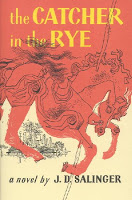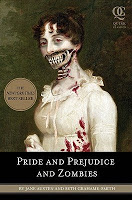In the spirit of the theory of six degrees of separation – that any two people in the world can be connected to one another through six relationships – we bring you what will become a semi-regular feature called “Six Degrees of the Library Collection”. These might not always be the most direct links between two points, but you might be surprised how your favourite book can connect you to a wide world of reading.
 Despite trying to famously retain his privacy for decades, JD Salinger has been in the news recently. A judge in New York granted a temporary restraining order against a book called “60 Years Later: coming Through the Rye” that purports to tell the tale of Holden Caufield at the age of 76. The judge is deliberating on whether the new novel is a violation of copyright.
Despite trying to famously retain his privacy for decades, JD Salinger has been in the news recently. A judge in New York granted a temporary restraining order against a book called “60 Years Later: coming Through the Rye” that purports to tell the tale of Holden Caufield at the age of 76. The judge is deliberating on whether the new novel is a violation of copyright.
Salinger’s Catcher in the Rye has undoubtedly been hugely influential, inspiring further artists and referenced in everything from film to tv to comics and video games . A particularly memorable instance of referencing the Catcher in the Rye comes in a monologue in John Guare’s play Six Degrees of Separation, where the main character Paul details his theories of the novel.
 Six Degrees of Separation the play, quickly became Six Degrees of Separation the movie, in which that impressive monologue was delivered by none other than Will Smith. At the time Smith was more well know for his rap career and TV sitcom than for film work but with success of this movie, and Smith’s critically acclaimed performance, he was propelled down the road to megastardom.
Six Degrees of Separation the play, quickly became Six Degrees of Separation the movie, in which that impressive monologue was delivered by none other than Will Smith. At the time Smith was more well know for his rap career and TV sitcom than for film work but with success of this movie, and Smith’s critically acclaimed performance, he was propelled down the road to megastardom.
In recent years, Will Smith has once again showed his strength in playing a character adapted for the screen in I Am Legend. The film, which was largely carried by Smith’s performance as the last remaining person in NYC after it has been overrun by vampires, was an adaptation of Richard Matheson’s 1954 novel (which, incidentally was set in LA).
 Matheson is a major name in the horror genre, steadily producing work since the early 50s. Matheson is said to have been an influence on another major American Horror writer, Stephen King, who dedicated his 2006 novel Cell (which is also about an apocalypse of the undead, although this time they are more zombie than vampire) to Matheson.
Matheson is a major name in the horror genre, steadily producing work since the early 50s. Matheson is said to have been an influence on another major American Horror writer, Stephen King, who dedicated his 2006 novel Cell (which is also about an apocalypse of the undead, although this time they are more zombie than vampire) to Matheson.
 Zombies are a big theme these days, which brings us to yet another adaptation: this year’s surprise hit Pride and Prejudice and Zombies by Seth Grahame-Smith. A re-telling of Jane Austen’s Pride and Prejudice that imagines what would have happened if that story took place during a zombie plague. The story begins “It is a truth universally acknowledged that a zombie in possession of brains must be in want of more brains.”
Zombies are a big theme these days, which brings us to yet another adaptation: this year’s surprise hit Pride and Prejudice and Zombies by Seth Grahame-Smith. A re-telling of Jane Austen’s Pride and Prejudice that imagines what would have happened if that story took place during a zombie plague. The story begins “It is a truth universally acknowledged that a zombie in possession of brains must be in want of more brains.”
And so it would seem that the logical next step would be to Jane Austen, but just to shake it up a bit we’ll take it to Oprah, who has recommended Pride and Prejudice and Zombies as one of her must reads of the summer of 2009.

